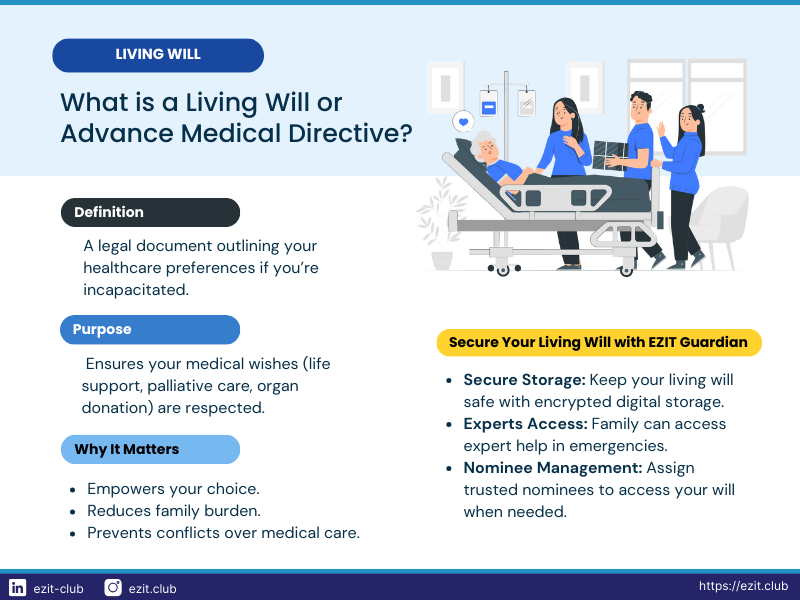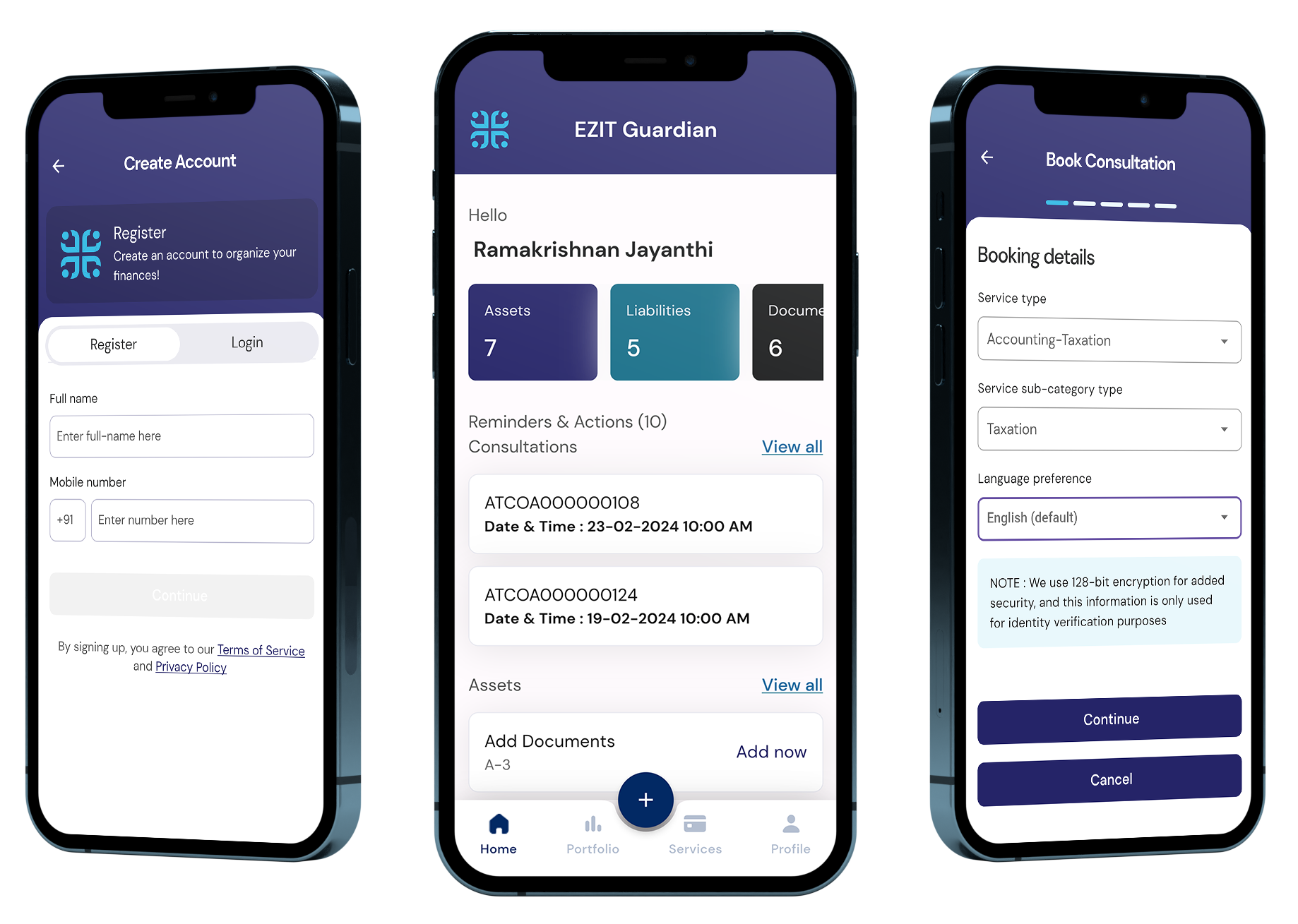TL;DR
Living wills, or advance medical directives, empower individuals in India to specify their healthcare preferences if incapacitated. Legally recognized since 2018, they face implementation challenges. EZIT Guardian offers secure storage for living wills in India, ensuring your healthcare wishes are preserved and accessible when needed.
Understanding Living Wills in India
Imagine you’re in a medical situation where you can’t speak for yourself. Scary, right? That’s where a living will comes in handy. In India, we call it an “advance medical directive,” but don’t let the fancy term throw you off. It’s simply a legal document that tells doctors and your family what medical care you want (or don’t want) if you can’t tell them yourself.
The Nitty-Gritty of Living Wills
A living will isn’t just a piece of paper – it’s your voice when you can’t speak. It covers situations like:
- Whether you want to be put on life support
- If you’d prefer palliative care over aggressive treatment
- Your thoughts on organ donation
- Specific treatments you’d accept or refuse
Think of it as your medical game plan, ready to be put into action if you’re not able to call the shots yourself.
Why Living Wills Matter in India
You might be wondering, “Do I really need this?” Well, let’s break it down:
- Autonomy in Healthcare: It’s your body, your choice. A living will ensures your medical decisions are respected, even when you can’t voice them.
- Alleviating Family Burden: Imagine your loved ones trying to guess what you’d want in a critical situation. A living will takes that weight off their shoulders.
- Preventing Familial Conflicts: Clear instructions can stop potential disagreements among family members about your care.
- Guiding Medical Professionals: Doctors can align their treatment plans with your expressed wishes, ensuring you receive care that matches your values.
- Peace of Mind: Knowing your healthcare preferences are documented can provide a sense of control and tranquility.
The Legal Landscape of Living Wills in India
Now, let’s talk legalities. It’s not the most exciting topic, but it’s crucial to understand where living wills stand in India’s legal system.
The Landmark 2018 Supreme Court Verdict
On March 9, 2018, the Supreme Court of India made a game-changing decision. In the case of Common Cause (A Regd. Society) v. Union of India, the court recognized the legal validity of living wills. This wasn’t just a small win – it was a major leap forward for patient autonomy in India.
Key takeaways from the verdict:
- Adults of sound mind have the right to create advance directives for end-of-life care.
- The court laid down guidelines for the execution and implementation of living wills.
- The judgment emphasized the paramount importance of individual autonomy in healthcare decisions.
Current Legal Framework
While the 2018 verdict was a milestone, the practical implementation of living wills in India is still evolving. The Ministry of Health and Family Welfare is in the process of developing comprehensive guidelines. Here’s what we know so far:
- Living wills must be signed by the executor in the presence of two attesting witnesses.
- A judicial magistrate must countersign the document to validate it.
- The living will should clearly state that it can be revoked or modified at any time by the executor.
Anatomy of a Living Will in India
So, what goes into a living will?
- Personal Information: This isn’t limited to just your name, rank, and serial number. Make sure to include your full name, address, age, and any other identifying details.
- Declaration of Intent: Make it crystal clear that this document is your living will or advance medical directive.
- Medical Conditions Covered: Specify the situations when your living will should kick in. This could include terminal illness, persistent vegetative state, or other defined conditions.
- Treatment Preferences: This is the meat of the document. Detail your wishes for:
- Life-sustaining treatments (e.g., ventilation, dialysis)
- Pain management and palliative care
- Organ and tissue donation
- Any specific treatments you want to avoid
- Healthcare Proxy: Nominate someone you trust to make medical decisions on your behalf if needed. Think of them as your medical power of attorney.
- Signatures: Your signature, along with signatures from two witnesses and a notary public or judicial magistrate.
- Review and Update Information: Include details on when the document was last reviewed and any revisions made.
Living Will vs. Regular Will: Clearing the Confusion
People often mix up living wills and regular wills. Let’s set the record straight:
| Aspect | Living Will | Regular Will |
|---|---|---|
| Purpose | Specifies healthcare preferences when incapacitated | Dictates asset distribution after death |
| Timing | Takes effect while alive but unable to communicate | Comes into effect after death |
| Content | Focuses on medical treatments and end-of-life care | Deals with property, assets, and guardianship |
| Flexibility | Can be changed as long as mentally capable | Can be updated until death, often requiring formal amendments |
| Executor | Designates a healthcare proxy for decision-making | Names an executor to manage the estate |
Understanding these differences is crucial for comprehensive life planning.
Challenges in Implementing Living Wills in India
While living wills are legally recognized, they face several hurdles in practical implementation:
- Lack of Awareness: Many Indians are unaware of living wills or their legal status.
- Cultural and Religious Factors: Some beliefs may conflict with the concept of pre-deciding end-of-life care.
- Complex Execution Process: Creating a legally valid living will can be a daunting and time-consuming process.
- Limited Acceptance by Medical Professionals: Some healthcare providers may hesitate to follow living wills due to legal uncertainties or lack of familiarity.
- Absence of a Central Registry: There’s no centralized system for registering and accessing living wills, making it difficult for healthcare providers to verify their existence in emergency situations.
- Potential for Misuse: Concerns exist about the potential misuse of living wills, particularly in cases involving property disputes or family conflicts.
The Role of EZIT Guardian in Safeguarding Living Wills
This is where EZIT Guardian steps in to make your life easier. We offer a secure solution for storing and managing your living will:
- Secure DocVault: Think of it as a digital fortress for your living will. We use state-of-the-art encryption to keep your document safe.
- Nominee Management: Easily assign and manage nominees who can access your living will in case of emergencies. It’s like giving a spare key to someone you trust, but for your important documents.
- Family Support: In critical situations, your family can quickly access your living will, ensuring your healthcare wishes are known and can be communicated to medical professionals.
By utilizing EZIT Guardian’s secure storage, you’re not just filing away a document – you’re ensuring that your voice can be heard when it matters most.
Conclusion
Living wills represent a significant step towards patient autonomy and dignified healthcare in India. They’re not just pieces of paper – they’re powerful tools that ensure your voice is heard, even when you can’t speak for yourself.
While challenges exist in implementation, the legal recognition of living wills paves the way for individuals to have greater control over their end-of-life care. It’s about making your wishes known and easing the burden on your loved ones during difficult times.
The clause can have far-reaching implications in various life situations, from sudden deaths to business dissolutions and family disputes. It’s crucial for account holders to understand the full scope of this clause and consider how it aligns with their overall financial and estate planning goals.
Ready to take control of your healthcare decisions?
Start your 90-day free trial with EZIT Guardian today. Experience the peace of mind that comes with knowing your living will is secure, accessible, and ready to speak for you when you need it most. Download the EZIT Guardian app from the Google Play Store & App Store today to schedule a consultation and take the first step to start securing your legacy.
By creating a living will and securely storing it with tools like EZIT Guardian, you’re not just planning for the future – you’re taking an active role in shaping it. You’re ensuring that your healthcare wishes are preserved and accessible when needed, providing peace of mind for you and clarity for your loved ones.


